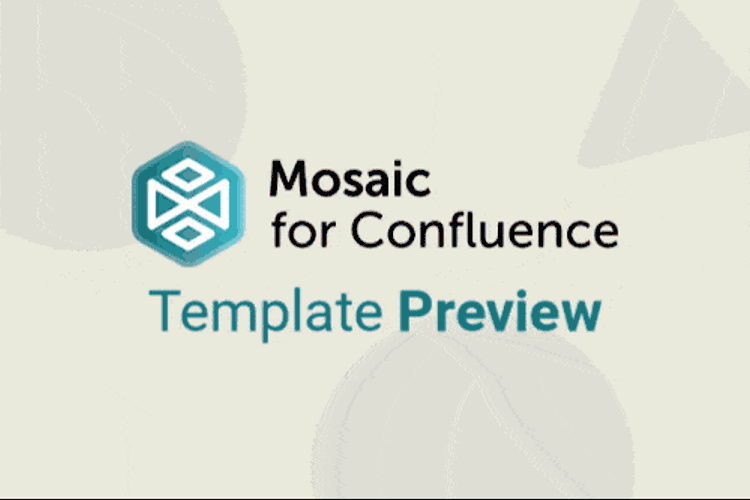Confluence Documentation Template
Ensure readers can (and do!) readily consume your important content with our easy-to-use documentation template.

Want to use our Documentation Template? Simply install Mosaic: Content Formatting Macros & Templates and choose it from the Confluence templates library.
Once you've installed Mosaic, follow these steps:
- In Confluence, click Templates in the top menu bar.
- Click on the templates search bar and type ‘Mosaic’.
- Select the ‘Documentation’ template, then click Use template to get started.
You can also view and use all the templates from the Mosaic app homepage. Just click Apps > Mosaic, scroll down to the templates section, and choose a template.
We have many different Confluence templates - find the right one for you and save time through automation!
What is documentation?
You likely have plenty of detailed guides, manuals, and reference materials for your business's customers and employees. Documentation can be highly technical and detailed or a short and simple how-to guide to ensure someone can use a product or service.
If you've struggled to get documentation into a logical and practical format, it might be time to start afresh. Our Confluence Documentation Template has everything you’ll need.
Read more: What is documentation?
If you've struggled to get documentation into a logical and practical format, it might be time to start afresh. Our Confluence Documentation Template has everything you’ll need.
Read more: What is documentation?
Why does your company need documentation?
Ensure satisfaction
Whatever you sell, you need to offer support. Documentation can include everything from common FAQs to legal information you must provide to ensure a user’s safety, so it’s a real business essential.
Minimise task duplication
Did you know that a massive 83% of employees recreate missing documents? If something can’t be found, it can be lost forever. Accessible documentation can be a huge time-saver!
Save important information
It’s been suggested that knowledge workers spend an average of 50% of their time creating and preparing documents, but without a document management strategy, 25% of these documents will be lost!
Ensure a single source of truth
When you store documents in a documentation template with Confluence, you can watch pages or the space to know when changes are made. You'll even get an email notification about who changed what, so you're always a step ahead. And because users can ‘like’ pages, you know they're valid.
What elements should documentation include?
Technical information
- System requirements (for software) - make users aware of compatibility issues and help them improve performance.
- Installation steps - help users to troubleshoot and install software and other products.

Latest Updates
- Important announcements
- New features
Troubleshooting / Use Cases
- Common issues your support or customer teams hear.
- Demonstrate real-life ways of using your product or service with extra articles under ‘use cases’.

Links and Anchors
- Documentation can be vast. Make it easy on the eye with anchors to add links to relevant pages and sections for easy navigation and reference.
Useful Macros
- Incorporate macros such as Table of Contents, Tip, Note, Info, Warning, and Panel to highlight important information and enhance readability.
Make your documentation go further
Engaging documentation pages are only great if your users can find them!
With Guided Pathways for Confluence, you can organise pages into handy step-by-step guides, helping users find answers quicker.
Reach out to claim your special offer on Guided Pathways:
How to use our Documentation Template
Now that you know what documentation is and why you definitely need it, you can download and use our Documentation Template.
